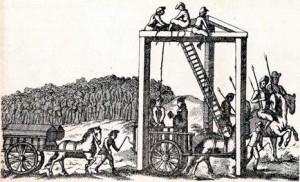
On 10th December 1541, Thomas Culpeper, gentleman of the Privy Chamber, and Francis Dereham, secretary to Queen Catherine Howard, were executed for treason at Tyburn. Dereham suffered a full traitor’s death, being “hanged, membered, bowelled, headed, and quartered” while Culpeper’s sentence was commuted to beheading. Their heads were then set on pikes and displayed on London Bridge as a warning to others of the fate of traitors.
Chronicler Edward Hall writes of their downfall:
“At this tyme the Quene late before maried to the kyng called Quene Katheryne, was accused to the Kyng of dissolute liuyng, before her mariage, with Fraunces Diram, and that was not secretely, but many knewe it. And sithe her Mariage, she was vehemently suspected with Thomas Culpeper, whiche was brought to her Chamber at Lyncolne, in August laste, in the Progresse tyme, by the Lady of Rocheforde, and were there together alone, from a leuen of the Clocke at Nighte, till foure of the Clocke in the Mornyng, and to hym she gaue a Chayne, and a riche Cap. Vpon this the kyng remoued to London and she was sent to Sion, and there kept close, but yet serued as Quene. And for the offence confessed by Culpeper and Diram, thei were put to death at Tiborne, the tenth daie of December.”